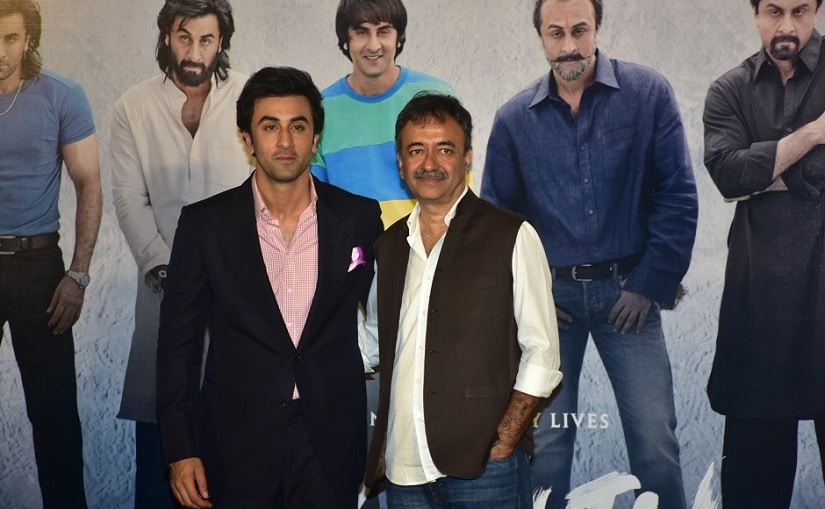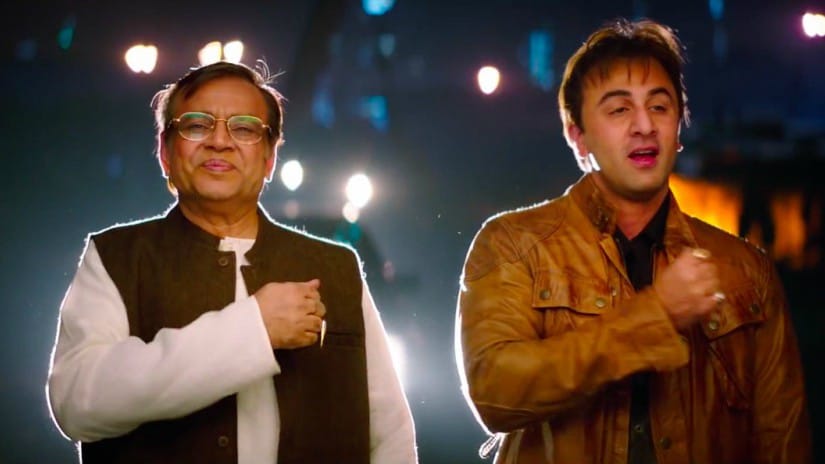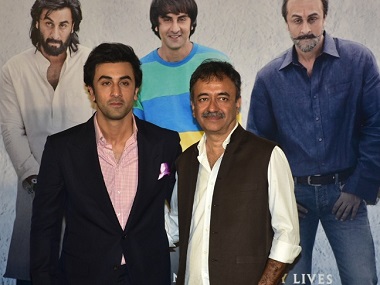The original Bad Boy of Bollywood arrived in theatres last week. Rajkumar Hirani’s Sanju has toppled box office records of opening day and weekend effortlessly; also tackling Baahubali by breaking a single day collection record. That the film’s a blockbuster goes without saying. That it might set new box office records looks like a certainty. That it has given Ranbir Kapoor’s career a leash of life is also validated. As euphoria rules over the successful reversal of fortunes for Ranbir Kapoor, and much deserved applause and praise come in for him and Vicky Kaushal, Hirani, as filmmaker, co writer and editor, is taking in much of the criticism and dissatisfaction with this lopsided biopic. In some ways this is a bit unfair. For when the smoke settles down, it will emerge clearly that Sanju is his victory more than anyone else’s. [caption id=“attachment_4613551” align=“alignnone” width=“825”]  Rajkummar Hirani and Ranbir Kapoor during Sanju promotions[/caption] This writer is not particularly a fan or admirer of Rajkumar Hirani’s brand of cinema. Sanju felt manipulative in parts. Yet one will not deny that while watching it, one was engaged and entertained throughout, which didn’t leave room to mull over its flawed, selective storytelling that seeks to validate a foolish man (child). Credit for this goes to the filmmaker-editor, and also to his partners in the project — Vidhu Vinod Chopra as producer and Abhijat Joshi as co writer.
Rajkumar Hirani has made an entertaining film, not so much a biopic.
Building upon facts from Sanjay Dutt’s life as recounted to him by Sanju Baba, he has developed two classic storytelling tenets on celluloid as tent poles of the film. The first is the father-son relationship; and the second, the emergence of the flawed underdog. In all his record busting, benchmark-setting films, Hirani has utilised these tenets to tell stories that have universal connect with Indian audiences. Sanjay Dutt’s life compares poorly with his father’s. The late Sunil Dutt belongs to a rare breed of politicians, for he was liked universally. As an actor, Dutt’s professionalism and sincerity was commended, and many recall his humility. Sanjay Dutt, on the other hand, is brash, spoilt and immature. Therein lies the central tension driving this film, that of a son never being able to fill his father’s boots. Similarly, despite his elite upbringing, and wealthy origins as the first born of two successful movie stars, Sanjay Dutt’s faulty start to acting, with drug addiction, marked him out as unreliable. Dutt’s screen presence and persona made him a natural fit for matinee idol. But as his contemporaries and younger stars began to grow swiftly. They were smarter and more disciplined, even as he remained inconsistent. In the race for superstardom, Dutt remained an underdog despite having an advantage in the start. These two aspects of storytelling run consistently through all of Hirani’s films. In Munnabhai MBBS, Munna is hell bent on impressing his father and then his girlfriend. He is the half literate goon amid doctors but his worldview and kind nature make him a better caregiver than most qualified medical professionals. It’s his father’s approval that he seeks above all else. Similarly, in Lage Raho Munnbhai, the goon seeks assurance and inspiration from the father of the nation. He is not worthy of a radio jockey, but finally, gets the girl. Hirani’s soft corner for the underdog emerged the strongest in 3 Idiots, where two of its protagonists seek to satisfy their parents at the cost of their aspirations. All three are underdogs, either academically or in terms of obedience and conventional behavior. The fraught father-daughter relationship is also at the core of Jagat Janani’s angsty and unhappy equation with her father in PK! Here, the underdog is an alien, no less, questioning the insanities of organised religion and god men. Getting a person to question religious obsessions might have stoked trouble from fringe elements, but who on earth can really question the alien that is lost? That PK! got a more or less unhindered run to topple and set up new box office records is a reflection of Hirani’s genius, for the film tackles religion and questions it’s implementation. Its wide acceptance also indicates that Hirani and Joshi wrote and developed a story that many relate to and believe in, but perhaps don’t voice by fearing judgments and reactionary behavior. [caption id=“attachment_4533441” align=“alignnone” width=“825”]  Paresh Rawal and Ranbir Kapoor from a scene in Sanju. Twitter/@RanbirKapoorFC[/caption] Sanju as biopic is incorrect and blind-sided. But as numbers show, audiences are loving the film. Ranbir Kapoor’s performance of a living person is so overwhelming that there’s little room to complain. Vicky Kaushal proves just how much promise he holds, and one can only hope in future filmmakers will write more films keeping the duo of Kapoor and Kaushal in mind. In the end though, the magic of Sanju is an outcome of the wizardry of Rajkumar Hirani and his creative collaborators Vidhu Vinod Chopra and Abhijat Joshi. Together, they have drawn from the strongest emotion of a parent-child relationship to explain the erratic behavior of a flawed person. Sanju is the first among biopics about the flawed that has had a golden run. And credit for that goes to its filmmaker Rajkumar Hirani who possesses the intuitive Midas touch of building a complex, layered narrative in a simplistic, emotional and dramatic manner. He has delivered the perfect masala film with this one, setting the bar high.


)
)
)
)
)
)
)
)
)



